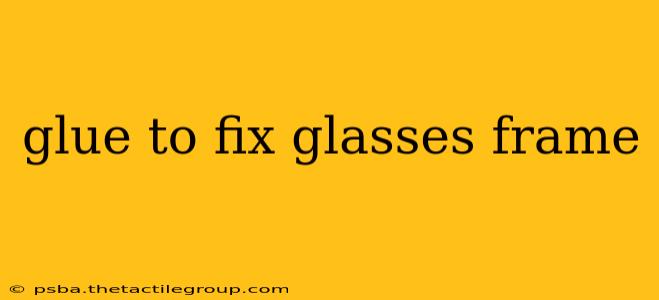Broken glasses frames? Don't panic! With the right glue and a steady hand, you can often repair them yourself and avoid expensive replacements. This guide explores the best glues for the job, offering insights into their strengths and weaknesses to help you choose the perfect adhesive for your specific needs. We'll also cover preparation techniques for a successful and long-lasting repair.
Understanding the Challenges of Repairing Glasses Frames
Glasses frames are often made from delicate materials like acetate, plastic, or metal. The glue you choose must be strong enough to hold the frame together under daily wear and tear, yet gentle enough to avoid damaging the material. Flexibility is also key; the glue needs to withstand bending and flexing without cracking or breaking.
Top Glue Choices for Glasses Frame Repair
Several adhesives excel at repairing glasses frames. The best choice depends on the frame material and the type of break.
1. Cyanoacrylate (Super Glue)
- Pros: Extremely strong bond, fast drying time, readily available. Perfect for small cracks or breaks.
- Cons: Can be brittle, prone to yellowing over time, difficult to work with and requires precision. Not ideal for large gaps or flexible materials.
- Best for: Minor cracks, small breaks in plastic or metal frames.
2. Epoxy Glue
- Pros: Strong, durable bond, resists water and chemicals, good for filling gaps. Provides a more flexible bond than super glue.
- Cons: Longer drying time, requires mixing two components, can be messy.
- Best for: Larger breaks, significant gaps, repairs involving metal frames or more substantial damage.
3. UV Resin Glue
- Pros: Very strong bond, clear finish, cures quickly under UV light. Excellent for precise applications.
- Cons: Requires a UV light source for curing, can be more expensive than other options.
- Best for: Precise repairs, delicate frames, situations where a clear, invisible bond is desired.
4. Specialty Optical Adhesives
- Pros: Designed specifically for repairing eyeglasses, often flexible and durable, less likely to yellow.
- Cons: Can be more difficult to find and more expensive than general-purpose adhesives.
- Best for: When a high-quality, long-lasting repair is paramount. Often worth the investment for valuable or frequently worn glasses.
Preparing Your Glasses for Repair
Before applying any glue, proper preparation is crucial for a successful repair:
- Clean the surfaces: Thoroughly clean the broken pieces with a lint-free cloth and isopropyl alcohol to remove any grease, dirt, or debris. This ensures a strong bond.
- Align the pieces: Carefully align the broken pieces as accurately as possible before applying the glue. Clamps or tape can help hold them in place while the glue dries.
- Apply sparingly: Use only a small amount of glue to avoid excess squeeze-out. Excess glue can weaken the bond and create an unsightly mess.
- Cure time: Allow the glue to cure completely according to the manufacturer's instructions. This is crucial for the strength and durability of the repair.
Choosing the Right Glue for Your Glasses Frame
The best glue for your glasses ultimately depends on several factors:
- Type of material: Different glues work best with different materials. For example, epoxy is suitable for metal, while super glue is a good option for plastic.
- Extent of damage: Small cracks may only need super glue, while larger breaks might require epoxy or a specialty adhesive.
- Desired finish: UV resin is a good option if you need an invisible repair.
- Your skill level: Super glue can be tricky for beginners, while epoxy requires a bit more patience.
By carefully considering these factors and following the preparation steps above, you can effectively repair your glasses frames and extend their lifespan. Remember, if you're unsure about undertaking the repair yourself, it's always best to consult an optician or eyewear repair professional.

